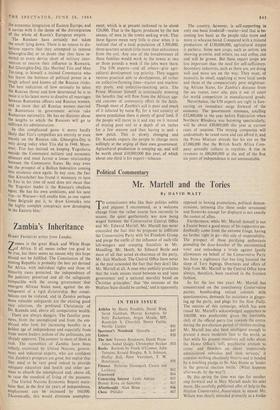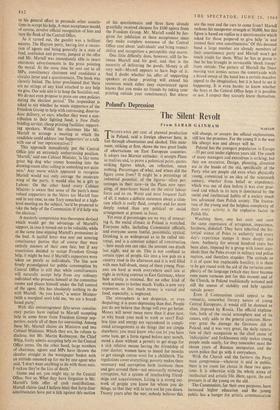Political Commentary
Mr. Martell and the Tories
By DAVID WATT rro connoisseurs who like their politics subtle I and piquant I recommend, as a welcome change from the rather coarse fare currently in season, the quiet gentlemanly war now being waged between the Conservative Central Office and Mr. Edward Martell. Mr. Martell has never concealed the fact that he proposes to infiltrate the Conservative Party with his Freedom Group and purge the outfit of the influence of such vile left-wingers and creeping Socialists as Mr. Maudling, Mr. Heath, Sir Edward Boyle and most of all that noted ex-chairman of the party, Mr. lain Macleod. The Central Office have never in the past concealed the fact that they don't like Mr. Martell at all. A man who publicly proclaims that the trade unions stand between us and 'sane government and a national morality based on Christian principles,' that 'the excesses of the Welfare State should be curbed,' and is apparently
opposed to boxing promotions, political demon- strations, tattooing (for those under seventeen) and fireworks (except for displays) is not exactly the cosiest of allies.
Furthermore, while Mr. Martell himself is not a Fascist beast a good many of his supporters un- doubtedly come from the extreme fringe, having no farther right to go—this side of respectability. The prospect of these purifying enthusiasts pounding the door-knocker of the uncommitted voter and unleashing a tirade against family allowances on behalf of the Conservative Party has been a nightmare that has long haunted the sleep of Tory bigwigs. Overtures and offers of help from Mr. Martell to the Central Office have always, therefore, been received in the frostiest fashion.
So for the last two years Mr. Martell has concentrated on the constituency Conservative parties, bombarding retired colonels with questionnaires, demands for assistance in ginger- ing up the party, and plugs for the New Daily. The success of this campaign, which has now raised Mr. Martell's acknowledged supporters to 160,000, was predictably given the inevitable shift of the official party line towards the centre during the pre-election period of clothes-stealing. Mr. Martell has also been intelligent enough to present a more moderate face to the world, so that while his present manifesto still talks about the Home Office's 'soft, psychiatric attitude to crime' and thunders on about 'expensively administered subsidies and state services,' it contains nothing absolutely bizarre and is headed by a touching pledge to Sir Alec Home as 'leader in the general election battle.' (What happens afterwards, by the way?)
By this spring the time was ripe for another step forward and in May Martell made his next move. His carefully publicised offer of help to the Huyton Conservative,Association to unseat Mr. Wilson was clearly intended primarily as a trailer to his general effort to persuade other associa- tions to accept his help. A mass acceptance would, of course, involve official recognition of him and turn the flank of the Central Oflice.
As it turned out, the gambit was a brilliant success. The Huyton party, having lost a succes- sion of agents and being generally in a state of feud, confusion and poverty, jumped at the offer and Mr. Martell was immediately able to insert enormous advertisements in the press pointing the moral. At the same time he sent out to all MPs, constituency chairmen and candidates a circular letter and a questionnaire. The hook was cleverly baited. The letter proclaimed that 'there are no strings of any kind attached to any help we give. Our sole aim is to keep the Socialists out. We do not even propose to press our own policies during the election period.' The respondent is asked to say whether he wants supporters of the Freedom Group to help with canvassing, door-to- door delivery, or cars; whether they want a con- tribution to their fighting fund; a New Daily briefing service; cheap printing facilities; support- ing speakers. Would the chairman like Mr. Martell to arrange a meeting at which the candidate could address 'our Supporters' or a talk with one of 'our representatives'?
This approach immediately put the Central Office into an extremely embarrassing position. 'Martell,' said one Cabinet Minister, 'is like some great big dog who comes bounding into the drawing-room after rolling in something not quite nice.' Any move which appeared to recognise Martell would not only outrage the moderate wing of the party, it would also be a gift to Labour. On the other hand every Cabinet Minister is aware that some of the party's most valued supporters in the Shires are Martell fans and in any case, as one Tory remarked at a high- level meeting on the subject, 'we'd be prepared to take the help of the Communists if it'd, help win the election.'
A masterly compromise was thereupon devised which would get the advantage of Martell's support, in case it turned out to be valuable, while at the same time nipping Martell's pretensions in the bud. A tactful letter was sent out assuring constituency parties that of course they were entirely masters of their own fate, but if any association decided to accept Freedom Group help, it might be best if Martell's supporters were taken on purely as individuals. The line now firmly promulgated for public consumption by Central Office is still that while constituencies will naturally accept help from any ordinary individual who presents himself at the committee rooms and places himself under the full control of the agent, this has absolutely nothing to do with Martell. 'As you know,' a senior Minister (with a marginal seat) told me, 'we are a broad- based party.'
With this encouragement fifty-seven constitu- ency parties have replied to Martell accepting help in some form from Freedom Group sup- porters, nearly all of them for canvassing. Among these Mr. Martell claims six Ministers and two Cabinet Ministers. Which they are, he refuses to disclose, but Mr. Martin Redmayne, the Chief Whip, freely admits accepting help on the Central Office terms. On the other hand, large numbers of chairmen, agents and MPs have thrown the circular straight in the wastepaper basket with an attitude summed up for me by one agent who said, 'I don't want anything to do with those nuts. I reckon they're the kiss of death.'
Game and set, you might say, to the Central Office. Not so. What they have forgotten is Mr. Martell's little offer of cash contributions. Martell claims (and I believe him) that forty-four constituencies have put a tick against this section
of his questionnaire and three have already gratefully received cheques for f100 apiece from the Freedom Group. Mr. Martell could be for- given for jubilation at these acceptances since they make complete nonsense of the Central Office cant about 'individuals' and bring respect- ability and recognition a perceptible step nearer.
One little difficulty does, however, still lie be- tween Martell and his goal, and that is 'the necessity of delivering the goods. Money is all very well—Martell appears to have bags of it. And I doubt whether his offer of supporting speakers or cheap printing will extend his resources much either (any experienced agent knows that you make no friends by taking your printing outside your constituency). But where are the men and the cars to come from? Martell reckons his manpower strength at 30,000, but this figure is based on replies to a questionnaire which asked for those prepared to give help 'in and around their own constituencies.' Of this devoted band a large number are already members of their constituency party and Martell won't get much credit for them. What he has to prove is that he has brought in serviceable 'shock troops' from outside. The picture of Martell the Duce moving vast armies across the countryside with a broad sweep of the hand has a certain macabre appeal to the imagination, but it is hard to see it happening. It is even harder to know whether the boys at the Central Office hope it is possible or not. I suspect they scarcely know themselves.



































 Previous page
Previous page